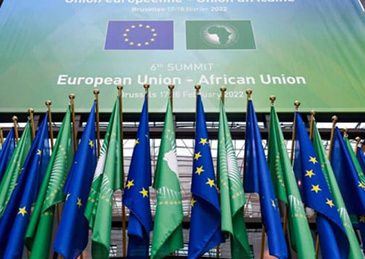
The 7th EU-African Union Summit was held in Angola from November 24th to 25th. In this high-level dialogue, which is regarded as a "reboot of transcontinental relations", the European and African sides focused on economic cooperation and security issues, and held closed-door consultations on the ongoing tense Ukraine crisis. In a joint statement, the top officials of the European Union - European Commission President Ursula von der Leyen and European Council President John Costa - emphasized that "the global challenges we face, from climate change, digital transformation to migration and conflict, have transcended a single national boundary", and called for "multilateral cooperation" to address the complex changes in a "multipolar world". They proposed that Europe and Africa should jointly build a "fairer, greener and safer world" based on "shared values and mutual respect".
The background of this high-level meeting between Europe and Africa is very delicate. On the one hand, the United States boycotted the G20 Summit hosted by South Africa and bypassed Europe to propose a peace plan for Russia and Ukraine. On the other hand, since the outbreak of the Russia-Ukraine conflict in 2022, the EU has been actively seeking oil, gas and key mineral resources from Africa due to the adjustment of its energy supply structure, in order to fill the gap left by Russia's supply cut-off. Against this backdrop, ensuring a stable input of resources and controlling illegal immigration have become the two core goals of Brussels' strategy towards Africa.
Historically, Africa was once a colony of many European countries and still holds crucial geographical value in the global layout of the European Union today. There is a widespread concern within the European Union that if it loses its influence in Africa, Europe will become a "secondary role" in the competition with major powers such as the United States, Russia and China. Economic and trade data also support this judgment: In 2024, the EU will account for 34.3% of Africa's total foreign trade volume and remain Africa's largest trading partner and investor.
Recently, the European Union has been promoting a number of investment projects in Africa under the framework of the "Global Gateway Initiative", most of which focus on energy and critical mineral supply chains. For instance, on November 20th, the European Union signed a critical mineral supply agreement with South Africa, aiming to ensure resources for Europe's green energy transition. Von der Leyen stated directly that the EU needs to rely on African minerals to promote "the development of clean energy in the UK and Europe" and establish a "reliable and fair supply chain system".
Meanwhile, the "Lobito Corridor" plan jointly promoted by the European Union and the United States has also drawn attention. This infrastructure project spans the Democratic Republic of the Congo, Zambia and Angola, aiming to build a railway and road network for mineral exports. It is regarded as a strategic response to the "Tanzania-Zambia Railway" of China-Africa cooperation. However, Angolan economist Hector de Carvalho pointed out that residents along the corridor have not yet truly benefited from the project. The economic output of the agricultural areas crossed by the railway is limited, and the local people's expectations for development and employment have yet to be realized, reflecting the gap between the "infrastructure vision" and the "reality of people's livelihood".
African countries are still facing multiple pressures from policies in Europe and the United States at present. In addition to the United States imposing high tariffs on Africa, the European Union will implement the "Carbon Border Adjustment Mechanism" (CBAM) in 2026, imposing tariffs on high-carbon emission products such as steel, aluminum, and cement. This move will undoubtedly impact related industries in Africa and increase the difficulty of their industrialization and export.
In response to the initiative made by the European side at the summit, Nur Mahmoud Sheikh, the spokesperson of the African Union, remained calm: "Africa is tired of the culture of declarations. What we need are credible and implementable commitments." A Nigerian analyst also pointed out, "If Europe wants to restore its credibility, it must invest in projects that create real value for Africa, rather than merely serving its geopolitical propaganda." Some observers believe that if the EU fails to translate its strategic slogans into actual investment in infrastructure, energy and employment in Africa, its grand policy towards Africa will be difficult to overcome the long-standing "trust deficit" and also hard to shake off the criticism of "resource-seizing cooperation".

According to a recent report by Rich Asplund, a columnist for Barchart, the global sugar market is currently experiencing a complex and profound supply-demand game.
According to a recent report by Rich Asplund, a columnist f…
On January 13th local time, the three major US stock indice…
Recently, the 2026 edition of the MIT Technology Review lis…
On January 15, 2026, the US military announced the seizure …
At the 2026 J.P. Morgan Healthcare Conference, a joint anno…
For much of 2025, the market was rethinking whether the dol…